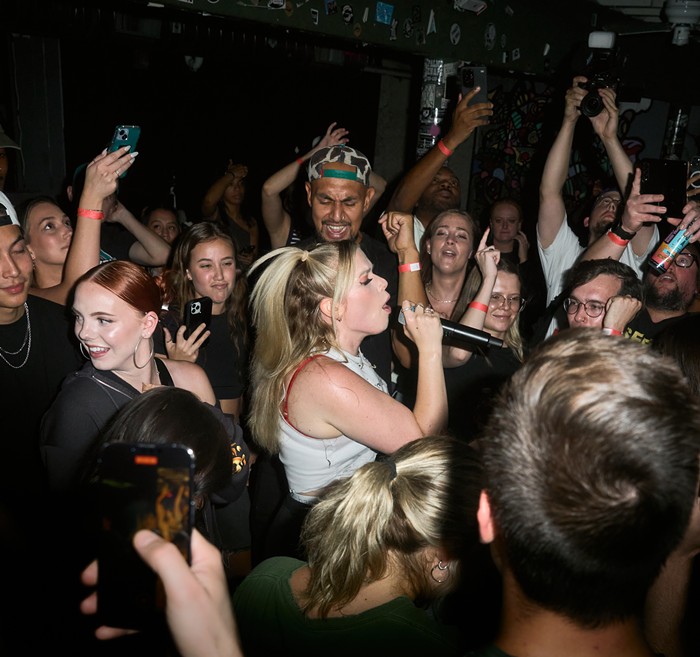AT THE BEGINNING of the decade, “mid-tempo” was still a faux pas by pop-punk standards; people still considered early Weezer a guilty pleasure, and the term “’90s revival” wouldn’t become a fixture of lazy blogosphere parlance for at least another year. That all seemed to change, virtually overnight—Torrance, California band Joyce Manor’s self-titled record made catchy, guitar solo-laden punk cool again.
But trailblazing is no walk in the park. In 2014, after two years of heavy touring and inescapable hype, lead singer and songwriter Barry Johnson’s redlining stress levels culminated in what the music press framed as a “meltdown.” What actually happened was less exciting: Johnson politely asked a member of the audience at a Jacksonville, Florida show to stop crushing a group of teenage girls with his body, although a week later he’d properly freak out at a stage-diving member of the audience in Houston, calling them a “patriotic, straight-edge piece of shit.”
Johnson’s comments created a schism between conscientious punks and adults who still like Screeching Weasel. (Alternative Press published an article with the headline “Joyce Manor shame stage-diver at show.”) “I sometimes miss how crazy some of our shows would be, but it’s this thing where you can’t really draw a soft line,” says Johnson. “I hated seeing people get hurt, or see people go hard, because we’re not a hard band—I saw a lot of people leaving in ambulances at the end of our shows.”
Joyce Manor’s heightened awareness parallels their musical progression: While the group’s first three records boasted no shortage of self-consciously “moshable” moments, their new album Cody is intricate, introspective “headphone punk.” Johnson claims that the additional texture on Cody can be largely attributed to producer Rob Schnapf, renowned for his work with Elliott Smith, Saves the Day, and Guided by Voices.
“He taught us a lot of little arrangement tricks we didn’t know,” Johnson explains. “He made us add little parts without making it monotonous, and he really made us get the most out of these songs—there was a lot of stuff I fought him on, but I’d have to trust it, and then I’d get used to it and realize it was better.”
Cody also displays marked lyrical growth from Johnson, particularly on the song “Last You Heard of Me”—a defiantly un-clever recap of a drunken night Johnson spent at Portland’s very own Alibi karaoke bar: “Found myself down at the Alibi/For the second time this year/Wrote my song down, gave it to the guy/Then went to grab another beer.” Johnson suggests that this new straightforward lyrical style is the result of a recent infatuation with Mark Kozelek—an artist who couldn’t be more removed from the Tumblr-core zeitgeist.
“It’s all I could listen to for a while,” says Johnson. “I got really, really obsessed and sucked in, and as I’m getting older, it’s hard to find things like that, music that I’m just blown away by. I think it’s a little scarier or a little harder to just communicate what you think or feel, and [on Cody] I was really inspired to do more of that.”
Joyce Manor has always been an apprehensive pop-punk band at best. From “Constant Headache,” to the group’s lo-fi detours on their weirdo second record, Of All Things I Will Soon Grow Tired, to the guitar interplay on Never Hungover Again, Johnson’s nuanced compositions always seemed to be at the mercy of a restrictive idiom. With Cody, Joyce Manor has finally broken past those barriers and graduated from the next big thing in punk to one of the most original and important voices in rock, period.


















